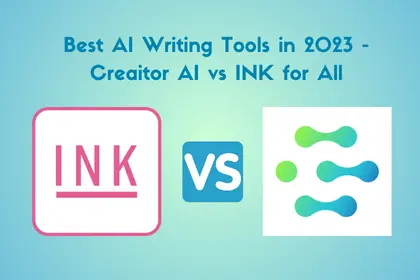The service-based business world is complicated, as the market is highly competitive and people have high expectations.
Service-based business owners always look for creative yet practical ways to enhance the customer experience as they want to succeed. One area that often gets missed, but can make a huge impact, is how easily clients can schedule an appointment. If the booking process is confusing or time-consuming, business owners risk losing potential customers.
One of the most common comparisons for service-based websites is Booking Plugin vs Contact Form.
So, in WordPress, you have two main options to organize bookings:
- Booking plugins
- Contact form for appointments
These two options can help you capture leads and manage appointments.
Let’s now understand which one wins in the Booking Plugin vs Contact Form comparison.
What Is a Booking Plugin?
A booking plugin is the perfect way to organize every meeting without confusion. Booking plugins keep everything in one place: booking details, customer info, service history, etc. Besides, clients can choose available time slots and avoid unconditional emails or calls. So, booking calendars are convenient in many aspects. Let’s discuss them.
First of all, booking plugins reduce human error because the tasks are automated and everything happens instantly.
Secondly, most of the booking plugins integrate with Google Calendar or iCal, so you never miss any appointment.
Thirdly, payments are made through your website via PayPal, Stripe, or WooCommerce.
Additionally, with WordPress booking plugins, you can customize the booking form to collect additional information, such as service preferences, special requests, etc.
The best part is that some booking plugins enable a client portal that allows users to view, reschedule, or cancel their appointments by themselves.
Lastly, booking plugins make your website look professional.
What Is a Contact Form?
A contact form is an easy way for people to send you a message through your website. They just fill in some basic details like their name, email, phone number, and a short message to get in touch with you.
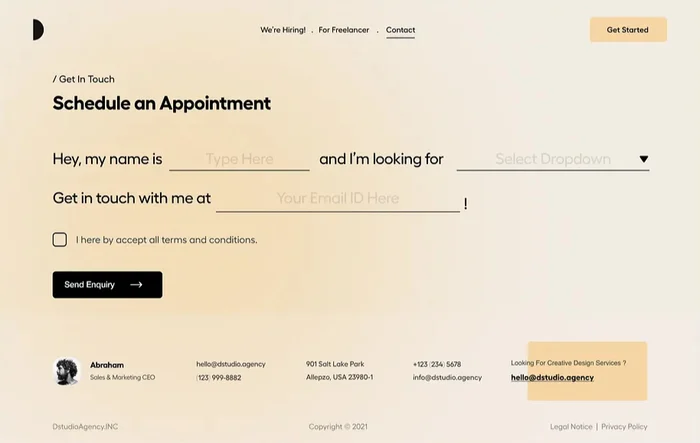
Contact forms are simple to create and can be changed to fit your needs. They are great for collecting basic info or answering general questions. But they may not be the best choice for service-based websites that need real-time bookings or automatic replies.
Let’s understand why:
Thus, contact forms lack features like real-time availability, automated confirmations, and payment processing and they require manual handling a lot. They can let people request a booking, but they don’t work automatically like booking plugins. They don’t show real-time availability, so users can’t see which times are free or book right away. This means you have to check and confirm everything yourself.
Unlike booking plugins, contact forms do not block off already-booked times or manage staff availability.
Another difference is that with contact forms, you can’t send automated confirmations and reminder emails/texts to your customers.
Furthermore, clients can’t reschedule, cancel, or view their upcoming appointment through a dashboard.
In contrast to booking plugins, with contact forms, people can’t assign appointments to different services. And, there is no way to manage repeating bookings or subscriptions.
Lastly, while the form may be mobile-friendly, the lack of real-time interaction makes mobile booking less effective.
The Best Booking Plugin: Amelia
Now that we’ve explored the Booking Plugin vs Contact Form comparison, and if you want to implement all these features on your WordPress website, Amelia Booking Plugin will be the top choice.
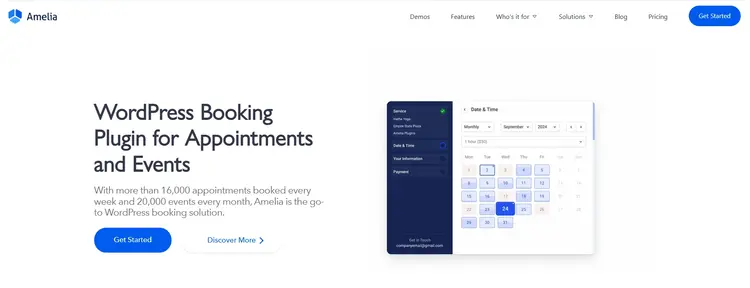
In fact, Amelia is often listed among the top booking plugins for WordPress in many reviews and industry articles, thanks to its powerful features and ease of use.
Amelia has all the powerful and necessary features to create seamless booking pages on your WordPress website. It has the best ratings and reviews on WordPress and a lot of happy customers. So, imagine having a booking system that is loved by many people and brings you a lot of benefits, such as conversion rates, more time spent on your website, and many more.

Here are the top main features of the Amelia Booking plugin:
Online Payment Integrations: Amelia connects with many secure payment gateways, so your website visitors can make their payments without problem.
Automated notifications and reminders: Choose when your customers will receive automated reminders and notifications before their upcoming events or appointments.
WooCommerce Integration: This integration simplifies the process of taking care of all your taxes, payments, and invoices.
Google Calendar Synchronization: With this integration, employees can connect their Amelia schedule to Google Calendar. When someone books an appointment, it will also show up in the worker’s Google Calendar, and the customer will be added too.
Packages of Services: You can group multiple services into a package and apply discounts to increase customer purchases.
Custom Fields for Booking Forms: If you want to collect specific information about your customers, custom fields will be an effective way to do that.
Events: Create single or multiple events and see who’s coming to attend.
Native Zoom Integration: As Amelia connects with your Zoom account, your customers can book online meetings through Zoom.
Multilingual Support: Your customers can make their bookings from anywhere due to Amelia’s multilingual support.
Google Meet Integration: Amelia also integrates with Google Meet so your clients can book only online events and get a meeting link in a confirmation email afterwards.
Recurring Appointments: And if you want to make it convenient for your customers, they can schedule recurring appointments.
Custom Service Duration: You can provide your service for any duration and set the price accordingly.
These features were only a small part of the 70+ features it has.
You can see all these features live on Amelia’s demo website.
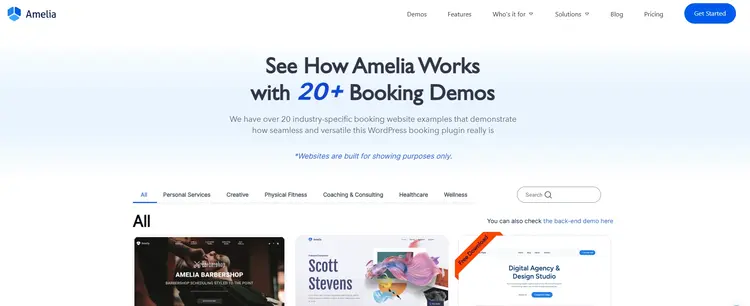
Pricing
Amelia has flexible pricing plans suitable for starters, small teams, and large enterprises.
All plans include 1 year of support, no hidden costs or add-ons, and a 15-day money-back guarantee. You can also enjoy up to 50% off your first year.
- Starter – $49/year
Best for – Solo entrepreneurs and freelancers - Standard – $89/year (10% off)
Best for – Small teams that need more functionality - Pro (Most Popular) – $129/year (30% off)
Best for – Growing businesses that look for advanced features - Elite – $319/year (50% off)
Best for – Agencies and enterprises that manage multiple sites
And, if you prefer a one-time payment, Amelia also offers lifetime pricing plans.
Check more information about Amelia’s pricing plans here.
Which One to Choose? – Booking Plugin vs Contact Form
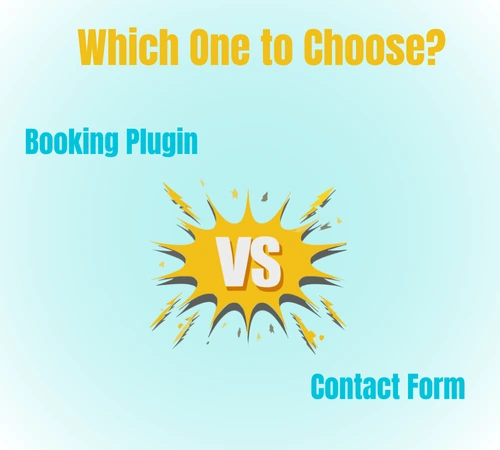
This list will help you choose between a booking plugin and a contact form based on what your business needs. It shows different situations and tells you which option works best for each one.
| Use Case | Best Option |
| Huge amount of appointments | Booking Plugin |
| Need for automation/reminders | Booking Plugin |
| Accepting payments | Booking Plugin |
| Managing multiple staff or services | Booking Plugin |
| Offering recurring appointments | Booking Plugin |
| Want to sync with Google Calendar/iCal | Booking Plugin |
| Need client self-service (reschedule/cancel) | Booking Plugin |
| Collecting advanced booking data (custom forms) | Booking Plugin |
| Require analytics/reporting | Booking Plugin |
| Support for group events or classes | Booking Plugin |
| Need Google Meet or Zoom integration | Booking Plugin |
| Need a client dashboard to view/manage bookings | Booking Plugin |
| Want real-time availability shown to users | Booking Plugin |
| Need service-based duration and custom pricing | Booking Plugin |
| Want to offer discounts or packages | Booking Plugin |
| Just starting or low traffic | Contact Form |
| Prefer manual control | Contact Form |
| Need open-ended inquiries (not just booking) | Contact Form |
| Handling complex or personalized requests | Contact Form |
| Don’t want to set up scheduling logic | Contact Form |
| Want a lightweight, minimal setup | Contact Form |
| Only need a simple way for users to contact you | Contact Form |
| Not offering real-time services (only quotes/inquiries) | Contact Form |
| Require high flexibility in the types of information collected | Contact Form |
Comparison Table (Visual Summary)
This visual summary helps you quickly compare the key features of a booking plugin and a contact form. It shows what each option can and can’t do.
| Feature | Booking Plugin | Contact Form |
| Real-time availability | ✅ | ❌ |
| Automated confirmations/reminders | ✅ | ❌ |
| Payment integration | ✅ | ❌ |
| Staff/service assignment | ✅ | ❌ |
| Manual handling required | ❌ | ✅ |
| Self-service (reschedule/cancel) | ✅ | ❌ |
| Custom form fields | ✅ | ✅ |
| Calendar sync (Google/iCal) | ✅ | ❌ |
| Client dashboard access | ✅ | ❌ |
| Analytics and reporting | ✅ | ❌ |
| Event and group booking | ✅ | ❌ |
| Integration with Zoom/Google Meet | ✅ | ❌ |
| Service duration and pricing control | ✅ | ❌ |
As shown above, in the Booking Plugin vs Contact Form visual summary, contact forms are limited when it comes to automation and advanced scheduling features.
Conclusion Section
So, in this Booking Plugin vs Contact Form comparison article, we thoroughly explored which is the best choice for service-based business owners. Therefore, if you are a service-based business owner, you already know everything about booking plugins and contact forms.
In summary, contact forms may be enough for very small operations or general inquiries, but a booking plugin like Amelia provides everything for professional, automated, and customer-friendly appointment scheduling.
So why settle for a basic form when you can offer a premium booking experience?
🔗 Try Amelia now with up to 50% off → Amelia Pricing
👉 Explore how it works → Amelia Demo
💡 Get started here → Amelia Landing Page
- 5 Best Mobile App Builders in 2025 - September 18, 2025
- Sitemap NoIndex SEO Tools vs Shopify Sitemap Apps - August 7, 2025
- Booking Plugin vs Contact Form for Appointments: Which Is Better? - August 1, 2025


